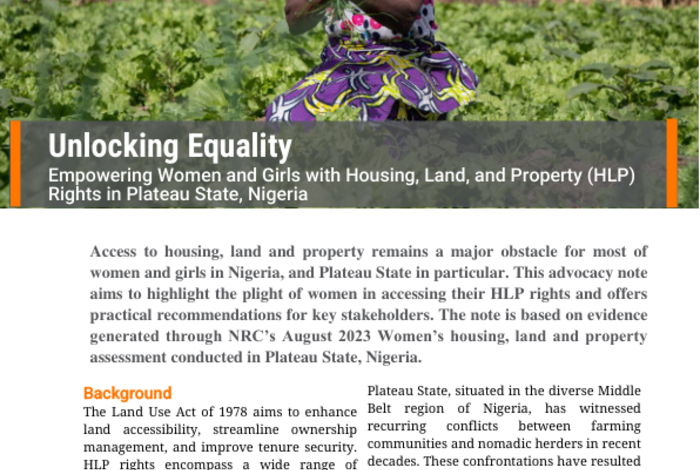Unlocking Equality: Empowering Women and Girls with Housing, Land, and Property (HLP) Rights in Plateau State, Nigeria – Advocacy Note, Jan 2024 – Nigeria

[ad_1]
Access to housing, land and property remains a major obstacle for most of women and girls in Nigeria, and Plateau State in particular. This advocacy note aims to highlight the plight of women in accessing their HLP rights and offers practical recommendations for key stakeholders. The note is based on evidence generated through NRC’s August 2023 Women’s housing, land and property assessment conducted in Plateau State, Nigeria.
Background
The Land Use Act of 1978 aims to enhance land accessibility, streamline ownership management, and improve tenure security. HLP rights encompass a wide range of entitlements, including the right to own, control, inherit, and utilize property. For women and girls, these rights are fundamental to their economic independence, social status, and overall well-being.
Plateau State, situated in the diverse Middle Belt region of Nigeria, has witnessed recurring conflicts between farming communities and nomadic herders in recent decades. These confrontations have resulted in the devastation of property and livelihoods, claiming the lives of numerous individuals, including women and children. Much of the violence has been rooted in disputes between those considered the original landowners and those seen as newcomers. While these conflicts primarily revolve around land access, cattle grazing, water, and other essential natural resources, the Middle Belt’s diversity often entangles land-based disputes with issues related to ethnicity, religion, and political power. In Plateau State, housing, land, and property (HLP) issues are regulated by a plural tenure system that encompasses both customary and statutory land tenure systems. Addressing HLP disputes in a post-conflict setting becomes challenging when land is held under customary tenure, as is the case in Plateau State. Customary norms are vital in land administration, especially in rural areas, offering practical benefits and ease of enforcement compared to statutory systems.
[ad_2]
Read More



